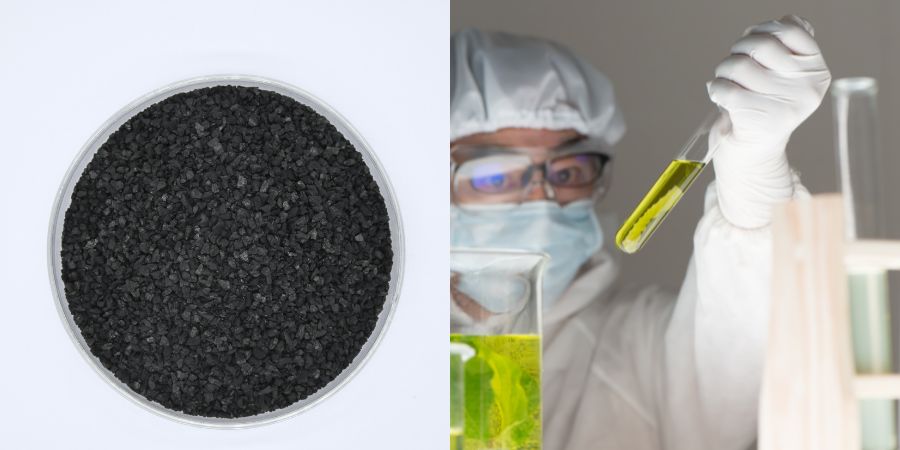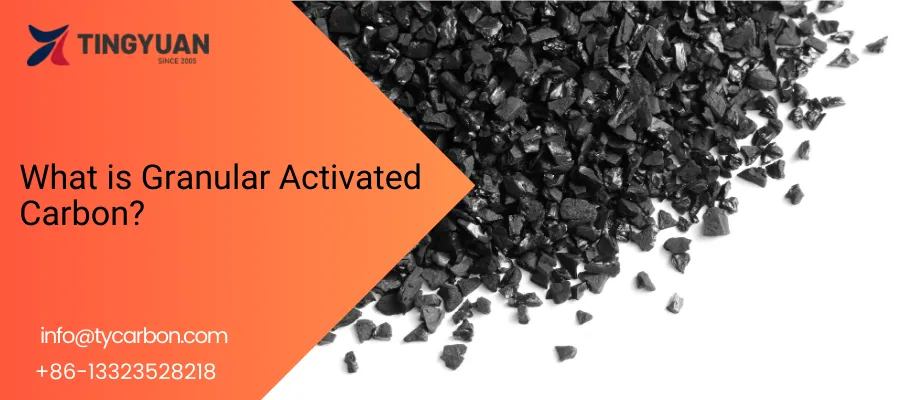Granular Activated Carbon (GAC) is a highly versatile and effective material used widely in various industries for purification, filtration, and adsorption processes.
In this article I will introduce what is granular activated carbon, it’s different materials, size and applications. Enjoying it!
What is Granular Activated Carbon?
Granular Activated Carbon (GAC) is a specialized carbon material characterized by its extensive porosity and large surface area, making it highly effective in adsorbing a wide range of contaminants from air and water. It is produced through the activation of carbonaceous materials, which can include coal, wood, and coconut shells, through either physical or chemical processes.
We have already understood what is Activated Carbon Granules. Next, I will introduce what material is it.
Main Materials for GAC

Granulated Activated Carbon can be made from various carbonaceous materials. The choice of material significantly influences the properties and effectiveness of the activated carbon. So understanding the different material is very important. Here are the common materials used to produce GAC:
Coal
Coal is one of the raw materials for production of granular activated carbon. Below is the type of three kinds of coal required for the production of granules.
- Bituminous Coal: Often used because of its high carbon content and relatively low cost. It produces GAC with a well-developed pore structure.
- Anthracite Coal: Known for its high hardness and high carbon content, producing a durable and effective activated carbon.
- Lignite: Lignite-based activated carbon typically has a high specific surface area and porosity, suitable for specific applications.
Coconut Shell
Coconut shell activated carbon is famous for its high micropore volume, making it exceptionally effective for adsorbing small molecular compounds. It also has high hardness and a large surface area and is a renewable resource.
Nut Shells
In addition to coconut shells, other nut shells like almond shells and walnut shells can also be used to produce granular charcoal.
- Apricot shell: The apricot shell is usually harder, has good strength, and has a higher pore volume and smaller pores. It is suitable for adsorbing small molecular weight compounds.
- Peach shells: These kind of activated carbon usually have more medium and large holes, suitable for adsorption compounds with large molecular weight.
I believe you have a basic understanding of activated carbon granules. Let’s learn the size.
Size and Application of Activated Carbon Granules

Granular activated carbon has a wide range of applications in a variety of fields and plays an important role in many industries, making significant contributions to improving the quality of life, protecting the environment, and promoting health, mainly including the following aspects:
- Water Treatment: Used for the purification, decolorization, dechlorination, and odor removal of drinking water, purified water, tap water, and industrial water.
- Beverage Industry: In the production of wine and beverages to remove taste and color, enhancing product quality.
- Air Purification: Used to remove pollutants from the air, including the purification of mercury-containing gases.
- Solvent Recovery: In industrial production for the recovery of organic solvents, such as gasoline, ether, acetone, etc.
- Gold Extraction: Combined with cyanidation, used in the process of gold extraction.
- Catalytic Applications: As a catalyst or catalyst carrier, widely used in chemical reactions.
- Food Industry: In food processing to remove color and taste.
- Medical Field: In medical equipment and processes for purifying air and water.
- Petrochemical and Steelmaking Industries: Used for wastewater treatment and gas purification in these industries.
- Fine Chemical Industry: Used in the purification process of high-purity chemical production.
These application areas demonstrate the importance of granular activated carbon due to its high adsorption performance in a variety of industries.
Common size and application of granular activated carbon
Activated Carbon Granules has different sizes, and it’s application is also different. Therefore, it is very important to understand the use of various sizes of granular activated carbon, which is extremely important for us.
4-8 & 4-12 Mesh Activated Carbon

This type of granular activated carbon has developed pore structure, which provides a good adsorption performance. The following is its application.
- Air Purification: Used for the removal of toxic gases and exhaust gas treatment, purifying indoor air.
- Water Treatment: Used for the purification of drinking water, industrial water, and tap water, including decolorization, dechlorination, and odor removal.
6-12 Mesh Activated Carbon

It is also known as gold carbon and has important applications in metal extraction and other fields due to its high adsorption capacity and selective adsorption as well as corrosion resistance.
Gold Refining:In the gold refining process, granular activated carbon is used to adsorb gold particles, achieving the separation and purification of gold.
8-30 Mesh Activated Carbon

It is ideal for many liquid phase applications including the removal of organics from water streams. The most high -quality nicotic coal activated carbon is used to reduce the ash of activated carbon and has a better adsorption ability. Manufactured at an NSF/ANSI Standard certified facility, it is suitable for drinking water and food grade applications.
- Drinking Water Treatment: Widely used in drinking water treatment, 8-30 mesh granular activated carbon removes odors, color, organic compounds, and residual chlorine, ensuring clean and safe drinking water.
- Food and beverage industry: For the process of decoloring, deodorization and purification in the food and beverage industry, remove odor, pigments and impurities, and improve product quality.
- Industrial Wastewater Treatment: In industrial processes, significant volumes of wastewater containing various organic compounds and heavy metals are produced. 8-30 mesh granular activated carbon efficiently removes these harmful substances, purifying wastewater to meet environmental standards.
12-40 Mesh Activated Carbon

With medium particle size, moderate pore structure, good mobility and adsorption rate, this activated carbon is suitable for a wide range of water treatment and gas phase purification applications, making it a stable and cost-effective activated carbon product.
The application of this granular activated carbon are very similar to those of the 8-30 mesh.The main applications are as follows:
- Food and beverage industry
- Water Treatment
- Industrial Wastewater Treatment
Conclusion
In conclusion, granular activated carbon is a highly effective and versatile adsorbent material with widespread applications in water treatment, air purification, gas purification, precious metal extraction, chemical manufacturing, food processing, and pharmaceutical industries, playing a crucial role in ensuring clean water, air, and products for various applications. If you want to buy high -quality activated carbon, please contact us.
If you are interested in the preferential price and technical parameters of our products, please leave your details, we will reply to you within 24 hours.

